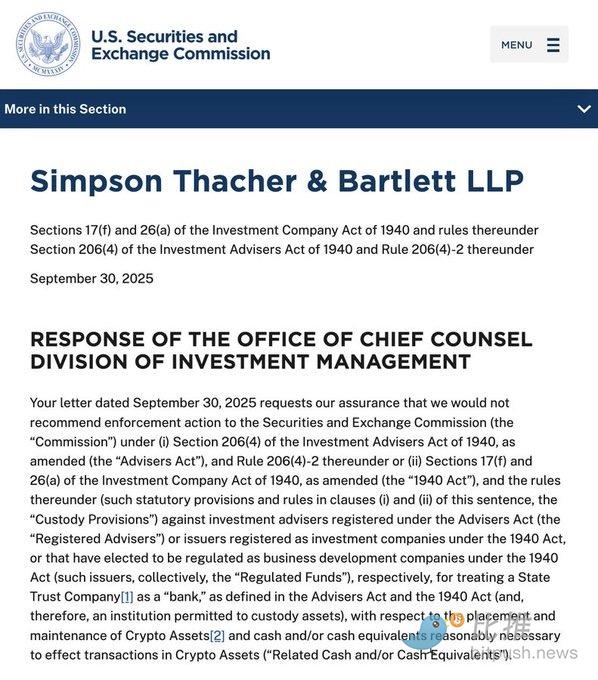On October 1st, Beijing time, the U.S. Securities and Exchange Commission ( SEC ) delivered a "Golden Week gift" to the crypto market. The agency 's Investment Management Department issued a significant No-Action Letter , officially confirming:
Registered investment advisors and regulated funds can place crypto assets in custody with state-chartered trust companies, and the SEC will not take enforcement action against them.
This letter means that the issue of "qualified custodian qualification", which has long been in a regulatory gray area, has finally been clarified - state trust companies can be regarded as "banks" in the legal sense, thereby obtaining the status of legally custodial crypto assets such as Bitcoin and Ethereum .
This means that the "qualified custodian" problem that has plagued Wall Street for years since the "custodial rule" controversy during the time of former Chairman Gary Gensler has been solved, and the last gate for institutional funds to enter the crypto market has finally been opened.

Background: Five-year evolution from “ban” to “openness”
Over the past few years, US federal regulators—including the Federal Reserve, the Office of the Comptroller of the Currency (OCC), and the Treasury Department—have implemented "Operation Choke Point 2.0" to severely restrict regulated financial institutions from providing services to crypto companies. The SEC also briefly considered crypto custody to pose a "systemic risk" and attempted to introduce new regulations requiring investment advisors to only hold crypto assets in the custody of "traditional bank-grade" institutions.
This practice is widely seen as a "destroying the financial resources" of state-licensed institutions like Coinbase and Kraken . However, with the Trump administration taking office in 2025 and the "Project Crypto" policy initiative promoted by current SEC Chairman Paul Atkins , the SEC's stance is rapidly shifting—from resistance to acceptance, from observation to construction.
Core content: State trust companies = formal recognition of "bank status"
According to SEC official documents, if an investment advisor or fund wants to use a state trust company as a custodian of crypto assets, it must meet four major conditions:
Annual Due Diligence
The Adviser needs to ensure that the Trust Company:
Obtain authorization from state banking regulators;
It has a complete internal control mechanism to prevent theft, abuse, and private key leakage;
Provide independently audited financial statements and SOC-1/SOC-2 internal control reports.
Sign a written Custodial Agreement
Custody companies are not allowed to lend, pledge or re-pledge crypto assets without the client's written consent, and the custody assets must be segregated from the company's own assets.
Risk Disclosure
Advisors are required to fully disclose to clients or fund boards the potential risks of using a state trust company to custody crypto assets.
Best Interest Test
The advisor or fund board must reasonably determine that the custodial plan is in the best interests of the client or shareholders.
The setting of these conditions ensures the three bottom lines of compliance, transparency and investor protection .
Industry reaction: The “dawn of regulation” for encryption
The letter is regarded by the industry as a "milestone in clarifying digital asset regulation."
James Seyffart, an analyst at Bloomberg Intelligence, commented:
“This is the textbook example of regulatory clarity the digital asset space has long awaited – the very change the industry has been calling for for years.”
U.S. Senator Cynthia Lummis of Wyoming also posted on X:
“We are pleased to see the SEC finally recognize state-chartered trust companies as qualified digital asset custodians. Wyoming pioneered this breakthrough back in 2020, and now the SEC has finally recognized the rigor and value of the state-level regulatory system.”
Currently, many well-known crypto companies, such as Coinbase Trust, Kraken Trust, and Anchorage Digital Bank, operate under the state trust charter system. This policy legitimizes these institutions, allowing them to legally provide custodial services to investment advisors, funds, and institutional clients.
The "route dispute" within the SEC
While this is a major victory for crypto custody, there is not unanimous approval within the SEC.
“The SEC should update its custody rules to allow technically competent institutions to self-custody digital assets, rather than exclude them,” Republican Commissioner Hester Peirce , long known as “Crypto Mom,” said in a speech in Singapore.
In contrast, Democratic Commissioner Caroline Crenshaw strongly opposed the unanimous decision, arguing that it amounted to "putting investors in a game of regulatory roulette across all 50 states. It is irresponsible to force such a major shift with a single letter without public comment and economic analysis."
Impact and Outlook: The “Green Light” for Institutional Custody of Crypto Assets
The practical significance of this letter of no objection goes far beyond providing peace of mind for compliance. It marks the first time that the US regulatory system has officially recognized the legal and compliant path for crypto custody, and may have the following impacts:
Accelerate the entry of institutional funds. Investment advisors and funds can now legally custody assets such as Bitcoin and Ethereum, clearing legal barriers for institutional digital asset allocation.
Strengthen the status of state trust systems. State trust companies (such as Wyoming, New York, and Texas) will become important pillars of crypto-financial infrastructure.
Promoting the institutional development of the crypto asset market. Following ETFs, "legalization of custody" is another key piece of the puzzle for institutional investors to participate in the crypto market.
Paving the way for future legislation. Although this letter is not formal law, it provides a realistic basis for Congress to pass legislation such as the Digital Asset Market Structure Act.
In short, when state trust companies obtain the same custodial status as banks, the last concerns of traditional funds in allocating Bitcoin and Ethereum have been eliminated, and a new institutional era is accelerating.
Twitter: https://twitter.com/BitpushNewsCN
BitPush TG discussion group: https://t.me/BitPushCommunity
Bitpush TG subscription: https://t.me/bitpush









